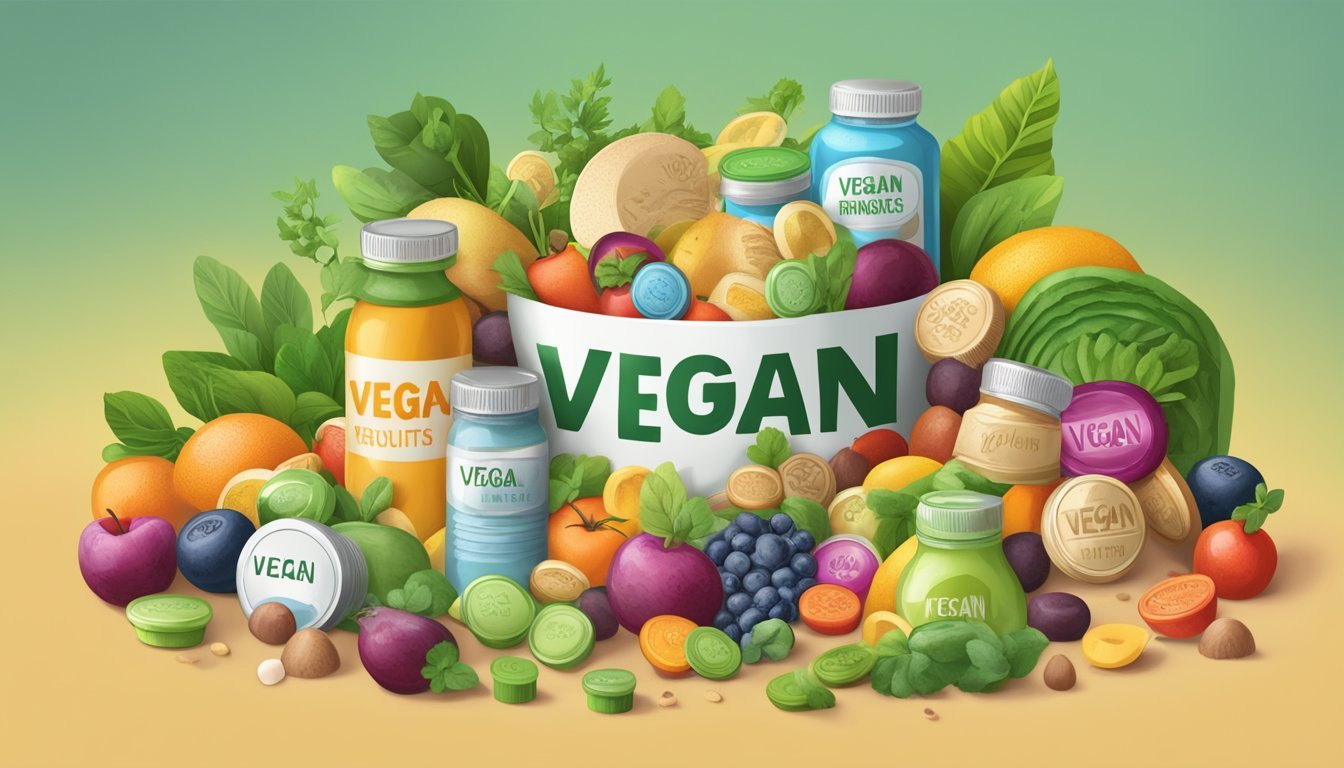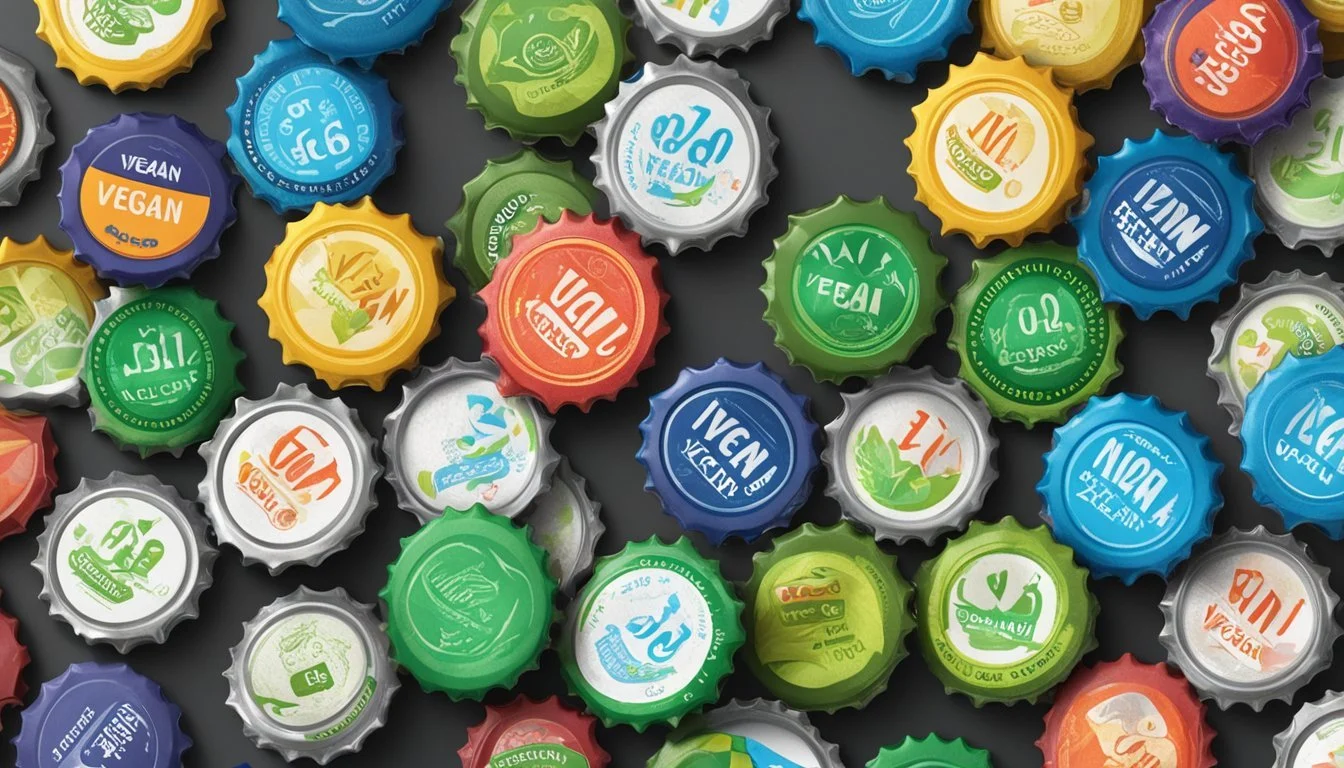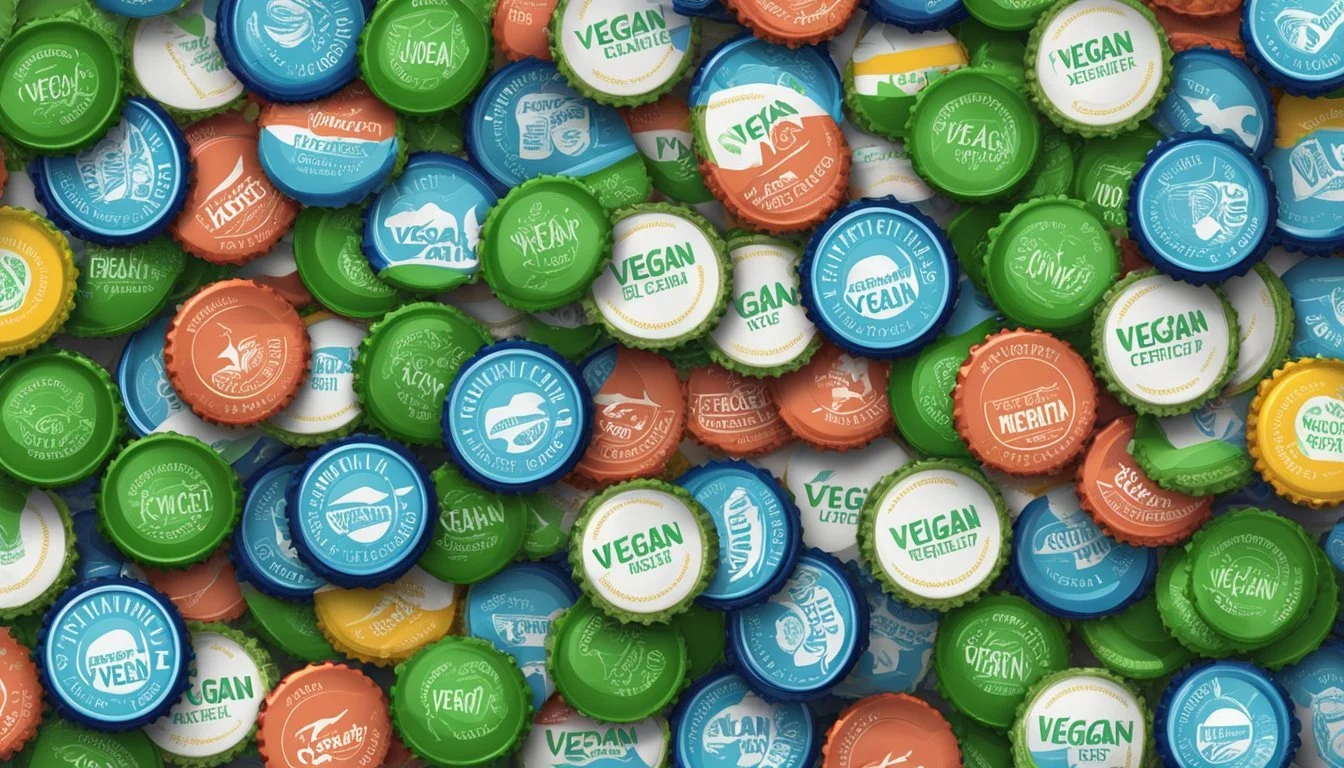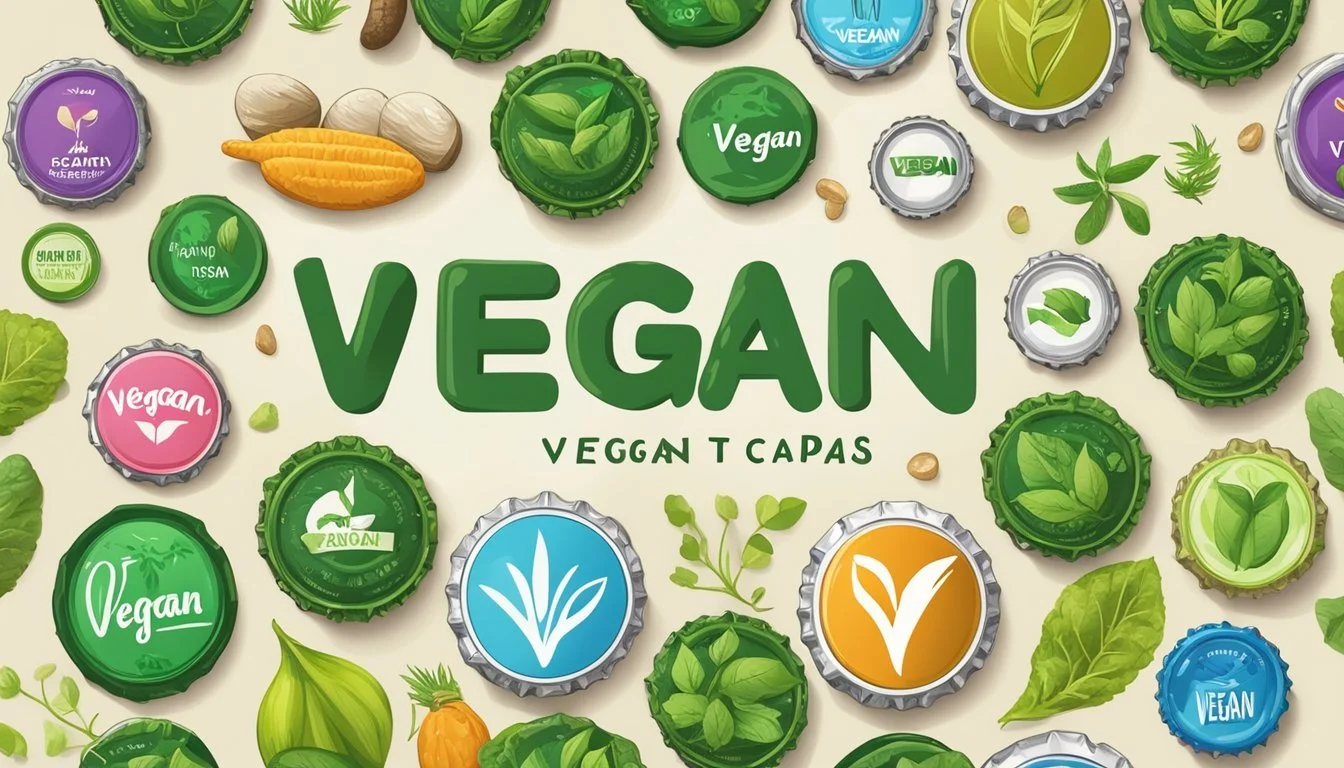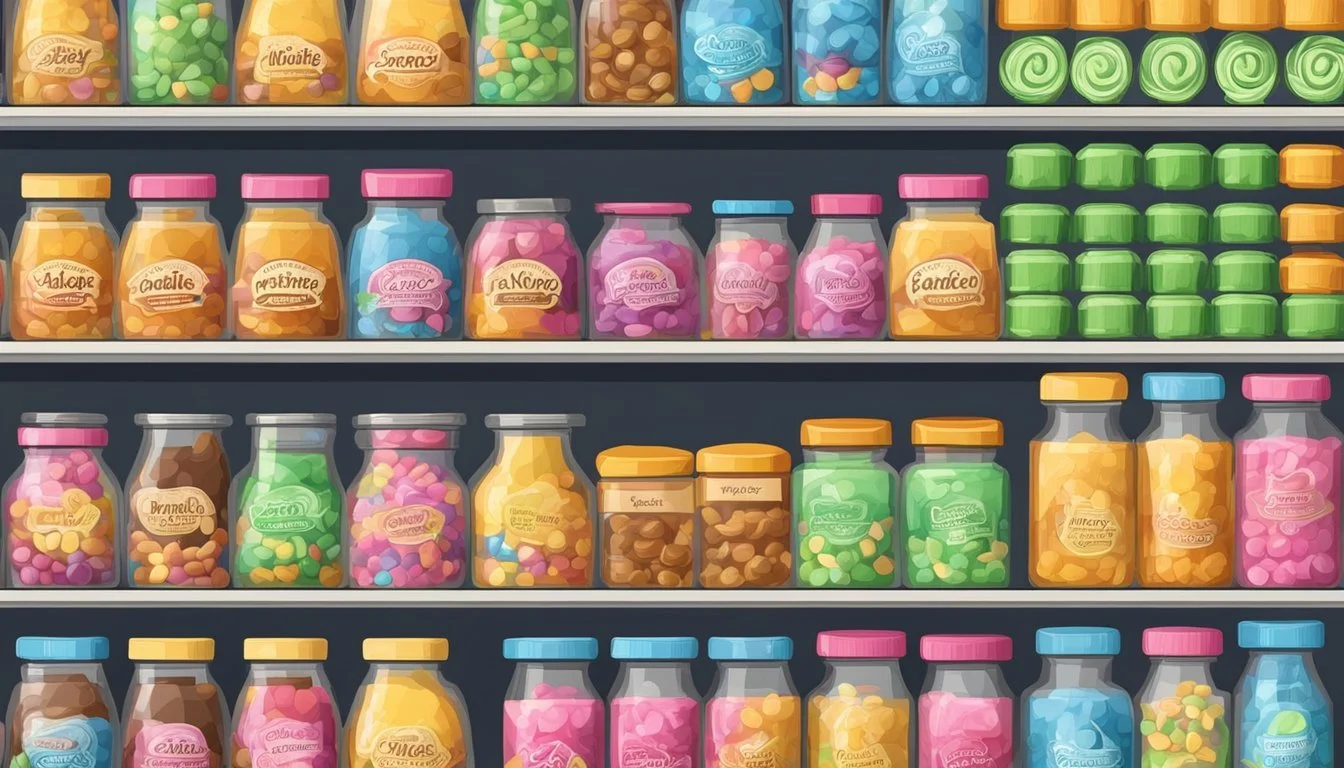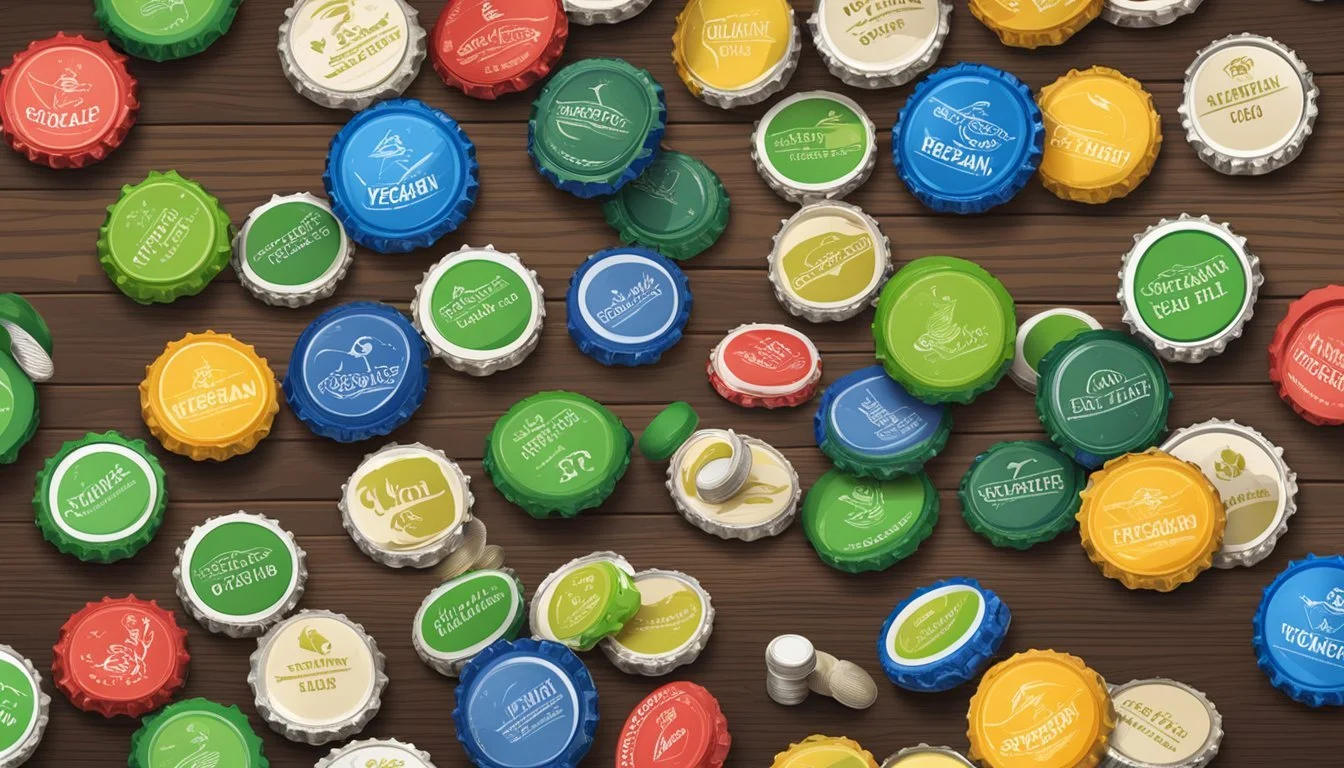Are Bottle Caps Vegan?
Unveiling The Truth About This Candy's Ingredients
Bottlecaps are a well-known candy that has been enjoyed by many over the years, coming in a variety of soda-inspired flavors. The question of whether Bottlecaps are vegan is particularly relevant to those adhering to a vegan diet, which excludes all animal products. Vegan consumers must thoroughly scrutinize ingredients to ensure that their dietary choices align with their ethical commitments.
The composition of Bottlecaps includes dextrose, maltodextrin, and less than 2% of calcium stearate, malic acid, phosphoric acid, natural flavors, caramel color, and Blue 1 Lake. While at a glance these ingredients might appear to be vegan, complexities arise with components like natural flavors and calcium stearate, which could be derived from animal sources. Additionally, the presence of artificial colors raises concerns for ethical vegans, who often avoid these due to their association with animal testing.
Veganism goes beyond diet, as it seeks to eliminate all forms of animal exploitation and cruelty. As such, even if a candy like Bottlecaps does not contain direct animal-derived ingredients, the use of artificial colors might still make it unsuitable for some within the vegan community. Moreover, cross-contamination could be a concern, as Bottlecaps are manufactured in facilities where egg products are also processed. Therefore, while the candy might be considered vegan by some standards, others might classify it as non-vegan based on broader ethical considerations.
Evaluating Vegan Status of Bottle Caps
The question of whether Bottle Caps candy is suitable for vegans revolves around their ingredients and their sourcing.
Defining Vegan Products
Vegan products are those that do not contain ingredients derived from animals and are not tested on animals. They align with a plant-based lifestyle that excludes all forms of animal exploitation and cruelty. When assessing if a product is vegan, one must scrutinize all ingredients and manufacturing processes for any animal involvement.
Analyzing Bottle Caps Ingredients
Bottle Caps are a widely recognized candy that features several ingredients in their composition. An analysis of the listed ingredients can reveal their compatibility with a vegan diet:
Sugar: Often processed with bone char from animals, but not always.
Dextrose: A sugar derivative usually plant-based.
Maltodextrin: A polysaccharide that is typically vegan.
Calcium Stearate: Sourced from stearic acid, which can be animal-based or plant-based.
Malic Acid: Usually vegan, as it is derived from fruits.
Natural Flavors: This term can be ambiguous, as it might derive from plant or animal sources.
Artificial Colors: While chemically synthesized and not containing animal products, some ethical vegans avoid them due to associations with animal testing.
Bottle Caps do not contain gelatin, shellac, or carmine, which are non-vegan ingredients commonly found in other candies.
It is noteworthy to mention potential cross-contamination issues as Bottle Caps are manufactured in facilities that may process other products containing egg, which may affect their vegan status for some individuals sensitive to cross-contact with animal products.
Common Non-Vegan Ingredients in Candies
When examining candies for vegan suitability, it's imperative to identify certain non-vegan ingredients that commonly appear in their composition. These can range from animal-derived products like gelatin to controversial additives like certain artificial colors.
Gelatin and Its Alternatives
Gelatin is a protein derived from animal bones, skin, and cartilage, frequently found in gummies and marshmallows. For those seeking vegan options, gelatin alternatives include plant-based gelling agents such as agar-agar, pectin, and carrageenan which are vegan-friendly.
Artificial Colors and Dyes
Candies often contain artificial colors such as caramel color, blue 1 lake, blue 2 lake, red 40 lake, yellow 5 lake, and yellow 6 lake. Some vegans avoid these because they are occasionally tested on animals. Nonetheless, the use of artificial colors does not necessarily make a candy non-vegan by composition.
Animal-Derived Ingredients
Apart from gelatin, other common animal-derived ingredients include carmine, a red dye made from crushed bugs, and shellac (also known as confectioner's glaze), which is derived from insect excretions. These are non-vegan and are often found in colorful confectionery.
Controversial Ingredients for Vegans
Some ingredients, while not directly animal-derived, are contentious within the vegan community. Natural flavors can be of animal or plant origin, and their source is not always clear. Also, some vegans avoid ingredients that are refined using animal products, even if the final product does not contain animal matter.
Vegan Labeling and Certification
In the context of vegan candy, consumers look for clear labeling to guide their choices, which includes certification marks from recognized organizations or indicators that the product is 'accidentally vegan'.
Official Vegan Certifications
Certified vegan candies carry specific logos that signal strict adherence to vegan standards. These certifications often involve a rigorous process where products—their ingredients and production methods—are thoroughly evaluated. For instance, the "Vegan Approved" logo by People for the Ethical Treatment of Animals (PETA) is one such emblem consumers can trust. Importantly, certified products ensure they have not been tested on animals—a critical aspect for many vegan consumers.
Examples of Official Vegan Certifications:
Vegan Action/Vegan Awareness Foundation: Displays the "Certified Vegan" logo.
PETA: Offers the "Vegan Approved" certification
The Vegan Society: Issues the "Vegan Trademark".
Products bearing these logos offer consumers confidence that the candies they choose are free from animal products and by-products.
Self-Certified 'Accidentally Vegan' Candies
Not all vegan-friendly candies have formal certifications; some are self-identified by the manufacturers as 'accidentally vegan'. These are products that do not contain animal-derived ingredients but have not gone through formal certification. It's important for manufacturers to provide transparent ingredient listings, which should be scrutinized for non-vegan additives such as gelatin, carmine, or casein.
Indicators of 'Accidentally Vegan' Candies:
Ingredients List: Lacks animal products like milk, honey, eggs.
Label Statements: May include phrases like "Plant-Based" or "No Animal Ingredients".
Consumers often compile and share lists of these candies in the vegan community for reference. However, the lack of certification means that cross-contamination with non-vegan products could occur, and the onus is on the consumer to determine the product's vegan status.
Bottle Caps Flavors and Varieties
Bottle Caps come in a nostalgic tablet shape similar to metal soda caps and offer a variety of distinct flavors. This section investigates the composition of the original flavors, scrutinizes any varieties that may not align with a vegan lifestyle, and positions Bottle Caps among other candy brands.
Original Flavors Analysis
Bottle Caps arrive with a suite of classic and beloved flavors that include cola, orange, root beer, cherry, and grape. The initial appeal of these candies lies in their ability to mimic the taste of traditional sodas. Unlike some candies such as Nerds or Sweetarts, Bottle Caps present a fizzy sensation that's reminiscent of their soda counterparts. They hold a special place in the Ferrara Candy Company's portfolio alongside other treats.
Potential Non-Vegan Flavors
Among the Bottle Caps flavors, it is important to consider the cherry flavor and others that may contain natural flavors and caramel color. These ingredients sometimes encompass animal-derived elements, making it crucial for strict vegans to exercise caution. In cases where natural flavors are involved, the exact sources are not always disclosed, leading to ambiguity in the vegan status.
Flavor Vegan Suitability Cola Potentially Non-Vegan Orange Potentially Non-Vegan Root Beer Potentially Non-Vegan Cherry Potentially Non-Vegan Grape Potentially Non-Vegan
Unlike some vegan-friendly candies like Skittles or Swedish Fish, the vegan status of Bottle Caps is less straightforward due to the nebulous nature of certain ingredients.
Comparison with Other Candy Brands
When comparing Bottle Caps to other candy brands, it's important to note that some, like Airheads and Jolly Rancher, may also contain questionable ingredients. Others, such as Twizzlers and Mamba, have made efforts to clearly indicate their vegan options. The vegan consumer frequently navigates similar challenges with brands like Smarties, Dots, and Fun Dip, which might offer clearer vegan-friendly choices. Bottle Caps' position within the pantheon of candy is unique due to their soda-inspired flavors, but their vegan status is still a grey area compared to some other brands that maintain a more transparent ingredients list.
Health Considerations of Consuming Bottle Caps
When considering the health implications of consuming Bottle Caps candies, two critical aspects stand out: the sugar and sweeteners used in their production, and the variety of additives and preservatives present. These have varying impacts on individuals with specific health conditions such as diabetes.
Sugar and Sweeteners
Bottle Caps contain dextrose and maltodextrin, both of which are types of sugars. Dextrose is a simple sugar that can rapidly increase blood sugar levels, making it a concern for those with diabetes. It's important for diabetic individuals to manage their blood sugar and to be aware of their total daily sugar intake.
Dextrose: Raises blood glucose levels quickly; diabetics should consume cautiously.
Maltodextrin: Can also impact blood sugar; used for its sweet taste.
Additives and Preservatives
In addition to sweeteners, Bottle Caps include substances like calcium stearate, malic acid, and phosphoric acid, which serve various functions in preserving flavor and texture. These additives are generally recognized as safe in the quantities found in food products, but they still carry implications for health:
Calcium Stearate: Acts as an anti-caking agent.
Malic Acid: Contributes to the tartness and is acceptable for most diets.
Phosphoric Acid: May affect bone health with excessive consumption.
Regular consumption of foods with these additives should be monitored, especially for those with specific dietary restrictions or sensitivities.
Environmental and Ethical Concerns
The production of candy, including Bottle Caps by Ferrara Candy Company, intersects significantly with environmental and ethical issues, particularly in the aspects of manufacturing processes, animal ethics, and packaging concerns.
Production and Manufacturing Processes
The manufacturing of candies such as Bottle Caps involves various processes that utilize machinery and may consume significant amounts of water and energy. Ferrara Candy Company, like any other manufacturer, faces the task of optimizing these processes to minimize environmental impact. It is important for consumers to consider whether the production methods embrace sustainability, such as using renewable energy sources, and how any byproducts are managed.
Animal Testing and Ethical Issues
While Bottle Caps do not contain animal-derived ingredients such as gelatin, which makes them suitable for vegans, the concern arises as to whether Ferrara Candy Company engages in animal testing for their products. The use of artificial colors in candies, for instance, has historically involved animal testing to ensure safety for humans. Consumers with a vegan ethos are inclined to determine if these colors were tested on animals, seeking assurance that the products align with cruelty-free standards.
Environmental Impact of Candy Packaging
Candy packaging is often made from metals or plastics that can be challenging to recycle, creating waste and environmental concerns. Packaging design and materials chosen by the manufacturer can significantly influence the overall environmental footprint of the product. As a result, the amount of recyclable or biodegradable material used in the packaging of Bottle Caps is a topic of interest to environmentally conscious consumers.
Alternative Vegan-Friendly Candies
For those looking to broaden their horizon with vegan-friendly sweets, several brands excel in offering delectable candies without animal derivatives. Not only are these options suitable for vegans, but they also cater to those seeking alternatives to mainstream candies that may contain non-vegan ingredients.
Recommended Vegan Candy Brands
YumEarth stands out in the market by providing an array of vegan candies that cater to different tastes while maintaining ethical standards. Their products are devoid of gelatin and other animal byproducts, making them an excellent choice for vegans. Here is a list of some vegan candy brands along with their popular products:
YumEarth: Known for organic and allergen-friendly candy options; their popular products include:
Organic Fruit Snacks
Organic Gummy Bears
Candy Kittens: Offers gourmet gummies with a focus on natural ingredients and is also gelatin-free.
Sour Watermelon
Tropical Mango
Eton Mess
DIY and Homemade Vegan Candy Options
For individuals who prefer making their candy, homemade vegan options provide complete control over ingredients and cater to personal taste preferences. Homemade candy can be made without artificial colors and flavors, instead using plant-based ingredients.
Here are a few ideas for DIY vegan candy:
Vegan Chocolate Truffles (What wine goes well with truffles?): Made with dark chocolate and coconut milk.
Fruit Jellies: Utilize agar-agar as a plant-based gelatin substitute and fresh fruit juice for flavor.
Peanut Butter Cups: Combine natural peanut butter and vegan chocolate to recreate this classic treat.
Consumer Guidance for Vegans
When choosing vegan products, consumers must be vigilant in identifying vegan-friendly retailers, understanding ingredient labels, and utilizing available resources. This ensures that their choices align with vegan standards, avoiding ingredients like natural flavors and artificial colors which may be sourced from animals.
Identifying Vegan-Friendly Retailers
Consumers should look for retailers that have a clear vegan section or labeling system. Amazon, for instance, offers a variety of items where vegan products are distinctly marked, making it easier for shoppers to find suitable options. Certifications from organizations like PETA (People for the Ethical Treatment of Animals) can also guide consumers to retailers that prioritize vegan-friendly merchandise.
Tips for Reading Labels and Ingredients
It's essential for consumers to familiarize themselves with ingredient lists on products:
Animal Ingredients: Be wary of non-vegan additives like gelatin, carmine, or shellac.
Artificial Colors: While some vegans may consume products with artificial colors, others might choose to avoid them due to ethical concerns or testing practices.
Natural Flavors: This can be of animal or plant origin; if in doubt, contacting the manufacturer is advised.
Vegan-friendly ingredients such as vegetable juice color can indicate a product is suitable for a vegan diet. Reading labels thoroughly is the key to avoiding animal-derived substances.
Vegan Candy Advocacy and Resources
Information and resources from vegan advocates can help individuals make informed choices:
Websites and Blogs: They provide detailed analyses of ingredients and vegan alternatives for popular candies.
Community Forums: Platforms like Reddit or Facebook groups where vegans discuss and share information on vegan products.
Apps: Tools like 'Is it Vegan?' can quickly assess the vegan status of a product by scanning its barcode.
Purchase and Accessibility of Vegan Candies
Consumers looking for vegan candy options, such as Bottle Caps, will find that both availability and cost are important factors. This section will explore the presence of vegan candies in retail stores, options for purchasing these candies online, and cost considerations that vegan consumers may face.
Availability of Vegan Options in Stores
Vegan candies are increasingly present on the shelves of both specialty health food stores and mainstream supermarkets. Depending on the retailer, consumers may find a designated section for vegan-friendly snacks, including popular candy brands like Bottle Caps. It is important to check the labeling, as some candies may not clearly indicate their vegan status.
Online Purchasing of Vegan Bottle Caps
Online retailers, such as Amazon, offer a wide selection of vegan candies, providing a convenient platform for consumers to purchase these items from anywhere. Bottle Caps can typically be found with detailed product descriptions, ensuring that buyers can verify their vegan-friendly and possibly healthy attributes before making a purchase.
Cost Considerations for Vegan Consumers
When purchasing vegan candies, consumers may notice a variation in price compared to non-vegan alternatives. This can be due to the sourcing of specific vegan ingredients that may be more costly. However, as the demand for vegan products increases, prices are becoming more competitive. Consumers should compare prices across different retailers to find the most suitable and economical options.
Consumer Reviews and Opinions
Consumer reviews and opinions offer insight into the vegan suitability and taste profiles of Bottle Caps candies.
Candy Enthusiasts and Vegan Community Feedback
Many vegan consumers express satisfaction with Bottle Caps due to their lack of animal-derived ingredients like gelatin, carmine, or confectioner's glaze, which are commonly found in other candies. However, concerns have been raised about potential cross-contamination, as they are produced in facilities that handle egg products. Ethical vegans also point out the use of artificial colors in Bottle Caps, which may conflict with some strict vegan principles due to the involvement of animal testing in the past or present associated with artificially synthesized ingredients.
Comparative Taste Tests and Flavor Reviews
In contrast, taste tests from candy enthusiasts have focused on the flavors offered by Bottle Caps, such as cola, cherry, grape, and root beer. It’s observed that the:
Cola flavor closely mimics the taste of traditional cola beverages and is often praised for its authenticity.
Cherry flavor receives accolades for its balance between tart and sweet notes.
Grape flavor is typically described as reminiscent of classic grape sodas.
Root Beer is recognized for capturing the essence of the beverage it intends to mimic.
Comparative taste tests and reviews consistently indicate that the flavor profiles are competently crafted, preserving the enjoyment of these flavors for those who choose a vegan lifestyle and enjoy nostalgic candy flavors.
Conclusion
When assessing whether Bottle Caps candies are vegan, one finds a nuanced picture. Key ingredients in question are natural flavors and calcium stearate. The origin of these substances can be either plant-based or animal-derived, making the vegan status of Bottle Caps uncertain.
Furthermore, the presence of artificial colors is a point of contention. Ethical vegans often avoid artificial colors due to the potential for animal testing. Thus, strict vegans might find Bottle Caps unsuitable.
For those seeking alternatives, brands like YumEarth provide vegan-friendly options that cater to a similar taste palette.
In light of this information, Bottle Caps can be considered vegan to some degree. However, for vegans prioritizing ethics over ingredients, these candies may not align with their values due to uncertainties regarding certain ingredients and the use of artificial colors.
Consumers should note that cross-contamination is a possibility, as Bottle Caps are manufactured in facilities handling non-vegan ingredients. Those with severe dietary restrictions should weigh this potential risk.
Vegan Status of Bottle Caps:
Ingredient Vegan Concern? Note Natural Flavors Possible Animal Source Confirmation needed from manufacturer Calcium Stearate Possible Animal Source Verification required regarding its origin Artificial Colors Ethical Concern Possible connection to animal testing
In conclusion, while Bottle Caps may appear to be vegan by ingredient, the complete vegan-friendly certification awaits due diligence on the origins of questionable ingredients and considerations regarding the ethical implications of artificial colors.

